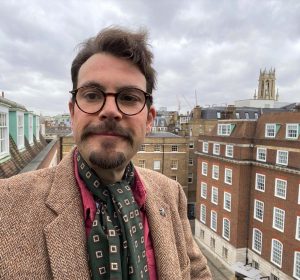Called: 2000
Circuit: Northern
Chambers: Deans Court Chambers, Manchester
Elected as a Barrister Governing Bencher in 2019

WHY DID YOU WANT TO BECOME A BENCHER?
I was fortunate to receive assistance for Bar School in London. The bursary given by the Inn made Bar School affordable, but it was the support of people at the Inn that actually made my professional success possible. It seemed obvious to me that as soon as I could, I would want to put something back into the Inn. I practise in Manchester and it has always seemed to me to be an important task to maintain and build on the national, and indeed international nature of our Inn community. I thought that becoming a Bencher would assist in achieving this.
HOW DID YOU FIND THE ELECTION PROCESS?
In all honesty a little nerve-wracking. It is difficult when you know that you are being scrutinised but I felt a great weight of responsibility to my supporting Governing Benchers not to let them down and to have their faith in me justified. The process gave me an opportunity to outline my commitment to the Inn and my ideas for what my contribution might be in the future.
HOW DID YOU IDENTIFY YOUR THREE SUPPORTING GOVERNING BENCHERS? DID THEY APPROACH YOU?
I was very lucky that I was approached by a very senior Governing Bencher who asked me whether I would like to do more for the Inn. I was immediately supported by two other Benchers who had always been very supportive to me in practice and whom I’d known since pupillage. I was genuinely honoured to be asked as I am of a relatively junior Call. Hopefully that just means I’ll have many years of fulfilling my promise to my supporting Governing Benchers that I’d do my best for the Inn.
WHAT COMMITMENT DID YOU MAKE TO THE INN BEFORE BECOMING A BENCHER?
I have always been passionate about the Inn’s outreach and education programme; maintaining and building the Inn’s presence on Circuit; and the life of the Inn generally. I am a mentor and conduct mock interviews for the Inn’s students. I attend all Inn functions in Manchester and go to as many events in London as possible. I am a trainer every year at Highgate House – I like to think that through these weekends we assist student members to achieve their fullest potential.
HAVE YOU VOLUNTEERED TO ASSIST THE INN WITH ANY ACTIVITIES, COMMITTEES OR IN ANY ROLES SINCE BECOMING A BENCHER? IF SO, WHAT WERE THEY AND WHAT HAVE YOUR EXPERIENCES BEEN?
Since becoming a Bencher I have joined the Outreach Committee and have been appointed the Assistant Master of the Northern Circuit. Having these roles is a great opportunity to be at the heart of the Inn’s continuing programme of outreach: keeping the Inn relevant in changing times and working on the Northern Circuit means we can work on organising more events that bring established members in contact with students in Manchester, Liverpool and Preston. This means that work that is already being done can be built on.
NAME SOMETHING ABOUT THE INN YOU HAVE LEARNED SINCE BECOMING A BENCHER?
I learnt that Bram Stoker, the author of Dracula, the archetypal vampire novel, was a member. I rather hope that he wasn’t inspired to write about a blood sucker by other members of the nineteenth century legal profession.
WHAT DO YOU SEE AS THE MOST FUNDAMENTAL ISSUE FACING THE INN TODAY?
The most fundamental issue is reaching out to those potential members of the Bar and encouraging, nurturing and building on their natural talents so that, whatever someone’s background, the Inn is bringing into the profession the very best individuals who will ensure the future of the Bar.
IN ONE SENTENCE, WHY DO YOU BELIEVE BEING A BENCHER IS REWARDING?
Having a role, however small, in the future of a profession I love, is the most rewarding aspect of being a Bencher.
HOW CAN BENCHERS ENSURE INNER TEMPLE REMAINS “THE PROGRESSIVE INN”?
It is important to balance tradition against current and future challenges, whilst maintaining the excellence of our members. We are a supportive Inn, with fellowship at our core, and that is the most significant building block in our future relevance for our members. As long as we keep listening to our members and those that want to join our profession – and responding to their legitimate needs – we will remain progressive.